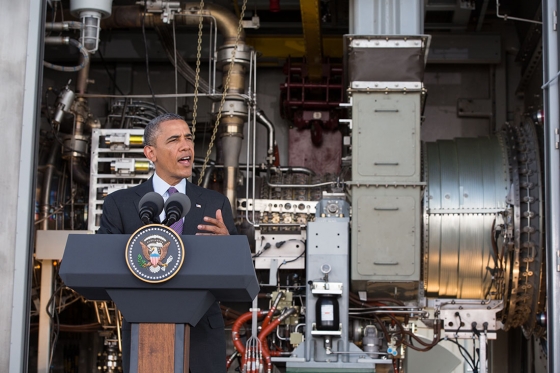
U.S. President Barack Obama speaks at a refurbished power plant in Tanzania on July 2, 2013. Obama chose to visit more democratically stable parts of Africa on his recent trip and avoided areas that are struggling, to the criticism of some. Photo: Official White House Photo by Pete Souza
Apparently President Obama has received some criticism over taking the “easy road” in his visit to Africa earlier this week. Instead of drawing attention to more troubled spots on the continent such as Nigeria or Kenya, he choose to visit the relatively safe, stable, and democratically potent (at least in terms of Africa) Tanzania, South Africa, and Senegal. In other words, he chose to accentuate the positive about Africa rather than rue the negative.
It raises an interesting question about how Obama can best use his (and by extension, the United States’) power and influence in Africa: as put by the New York Times, should Obama be “a president who directly confronts the challenges of a continent, warts and all, or one who sidesteps the negative on his visit to try to inspire a better future?”
I feel the criticism is misguided. Obama using his tour of Africa to highlight positive developments and show that the continent is not doomed to fail can have a lasting positive impact. It will hopefully show the people that change for the better is possible (and, in fact, is already happening), and serve as powerful motivation for development and improvement.
A reprimand from the U.S. president will not result in the kind of change that is needed in troubled areas, will not result in the establishment and/or strengthening of democracy. The only way dictators topple is by citizens of the country they rule demanding it. The recent rise is protest movements the world over — from Brazil to Turkey in weeks past, to of course Egypt right now — have reaffirmed the power the people can have, regardless of the level of control of the ruling person/group. People now freed from economic, political, or police restraints (i.e., the fear for personal safety at hands of the state) — or sometimes in spite of them — are indicating opposition and demanding (democratically-motivated) change.
As mentioned in this column before, democracy is far from easy, and just because you receive a mandate from the people in an election does not mean they’ll agree with everything you say or do. Just ask Mohamed Morsi of Egypt. People there seem to have gotten the hang of protesting in very short order – though I must mention that reports of sexual assaults and crimes against women during Egyptian protests are surfacing, which are disgraceful and must be strongly condemned. The right to protest does not imply the right to commit crimes, especially not crimes of this nature.
So pressure on leaders in Africa where things aren’t going well from President Obama may may help by drawing attention to the plight of those in desperate need of help. But far more meaningful would be demands for change from the people in question. It will certainly be difficult and probably dangerous.
But change for the better always is.